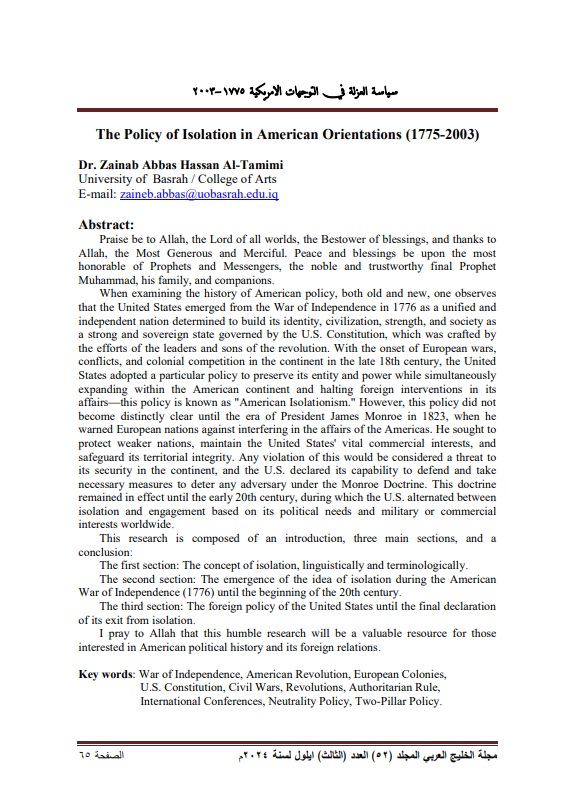The Policy of Isolation in American Orientations) 1775-2003)
Keywords:
War of Independence, American Revolution, European Colonies, U.S. Constitution, Civil Wars, Authoritarian Rule, International Conferences, Neutrality Policy, Revolutions Two-Pillar Policy.Abstract
Praise be to Allah, the Lord of all worlds, the Bestower of blessings, and thanks to Allah, the Most Generous and Merciful. Peace and blessings be upon the most honorable of Prophets and Messengers, the noble and trustworthy final Prophet Muhammad, his family, and companions.
When examining the history of American policy, both old and new, one observes that the United States emerged from the War of Independence in 1776 as a unified and independent nation determined to build its identity, civilization, strength, and society as a strong and sovereign state governed by the U.S. Constitution, which was crafted by the efforts of the leaders and sons of the revolution. With the onset of European wars, conflicts, and colonial competition in the continent in the late 18th century, the United States adopted a particular policy to preserve its entity and power while simultaneously expanding within the American continent and halting foreign interventions in its affairs—this policy is known as "American Isolationism." However, this policy did not become distinctly clear until the era of President James Monroe in 1823, when he warned European nations against interfering in the affairs of the Americas. He sought to protect weaker nations, maintain the United States' vital commercial interests, and safeguard its territorial integrity. Any violation of this would be considered a threat to its security in the continent, and the U.S. declared its capability to defend and take necessary measures to deter any adversary under the Monroe Doctrine. This doctrine remained in effect until the early 20th century, during which the U.S. alternated between isolation and engagement based on its political needs and military or commercial interests worldwide.
This research is composed of an introduction, three main sections, and a conclusion:
The first section: The concept of isolation, linguistically and terminologically.
The second section: The emergence of the idea of isolation during the American War of Independence (1776) until the beginning of the 20th century.
The third section: The foreign policy of the United States until the final declaration of its exit from isolation.
I pray to Allah that this humble research will be a valuable resource for those interested in American political history and its foreign relations.




